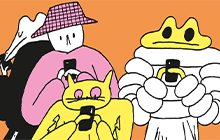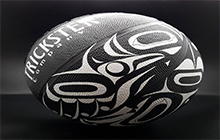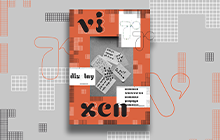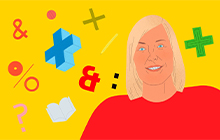Our data comes from the 2019 AIGA Design Census ↗, which surveys design professionals across the country about their salary, job satisfaction, future outlook, etc. Looking at the dataset, we were drawn to the question “What critical issues face design?” where we found a hidden gem: while respondents could choose from multiple-choice answers, they could also write-in their own answers!
It was in the 2700+ written responses we found the “core” of the respondents’ feelings: honesty, frustration, skepticism, and hope. As direct quotes, these words were personal in a way that the more discrete data was not. We wanted to use this corpus to tell a story, to see data points as people, and not as numbers.
This project exists in two forms: an exploratory website, and a printed, interactive book. We designed both of these artifacts as tools for data exploration, but specifically, exploration that begins with language.
Created for Communications Studio IV at CMU School of Design, Spring 2020.Advised by prof. Kyuha Shim.
Parsing Through Data
We used python and NLTK to parse the corpus, collecting the most frequent 150 words (excluding function words like “I,” “the,” “only,” etc.), bi-grams and tri-grams. Looking at the lists, we picked out words and phrases that described themes or ideas. From there, we grouped the words into six broader categories: power, representation, education, quality, change, and community.
We used these dictionaries to parse through the quotes again in order to sort which responses fell in which category.
Category Briefs
Power
"color", "white", "money", "pay", "in leadership", "of color", "of diversity"Representation
"ageism", "diversity", "of diversity", "women", "woman", "standards", "a seat", "of respect for"Education
"education", "students", "school", "design education", "young designers"Quality
"good design", "value", "lack", "understanding", "the quality of", "time"Change
"environmental", "ethics", "ethical", "future", "climate change", "to change the", "impact"Community
"social media", "the real world", "community", "design communities", "the general public"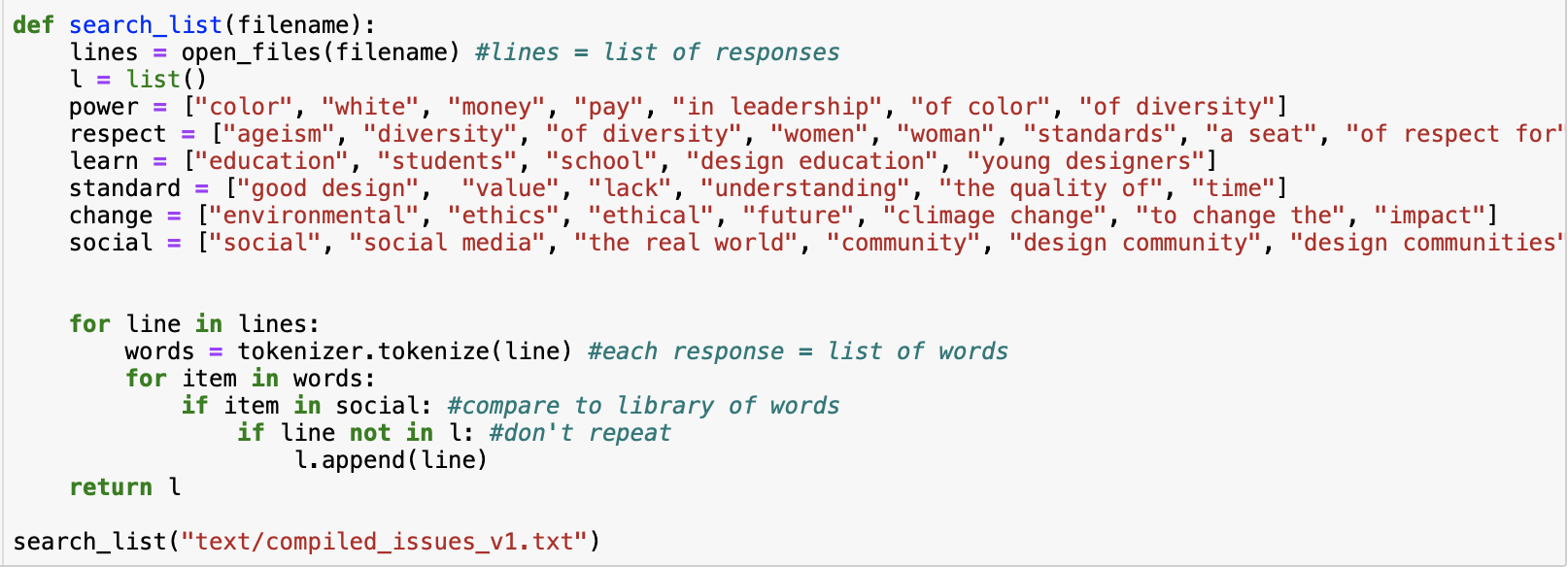
The code did not account for responses that didn’t match any of the dictionaries, and did not tag if a response falls into multiple categories, so we had to do that manually later on.
This site is a prototype of a bigger collection, because we couldn’t integrate all 2700+ quotes. We selected ~25 quotes per category to analyze further, and picked phrases that described the main point or theme of each response. If quotes intersected with other categories, we made sure to highlight those phrases as well. (And we made a super sexy color-coded spreadsheet ↗ ) To find spot words (eg. 18 mentions of “age-ism”), we ran word frequency throughwith the entire corpus.
Jaclyn Saik ↗ is a Junior studying Communication Design, with a minor in HCI at Carnegie Mellon University, who can often be found talking about the coffee she’s drinking or drawing with crayons. She believes the most critical issue facing design is maintaining individuality and human qualities in an increasingly automated world.
Age
21Identity
White FemaleLocation
Mountain View, CAIndustry
StudentRachel Lee ↗ is a Junior majoring in Communication Design and HCI at Carnegie Mellon University, who can often be found eating eggs or doing pilates. She believes the most critical issue facing design is instilling passion and desire in designers to create positive change for the world.
Age
21Identity
Asian FemaleLocation
Hong Kong,Hong Kong SAR


